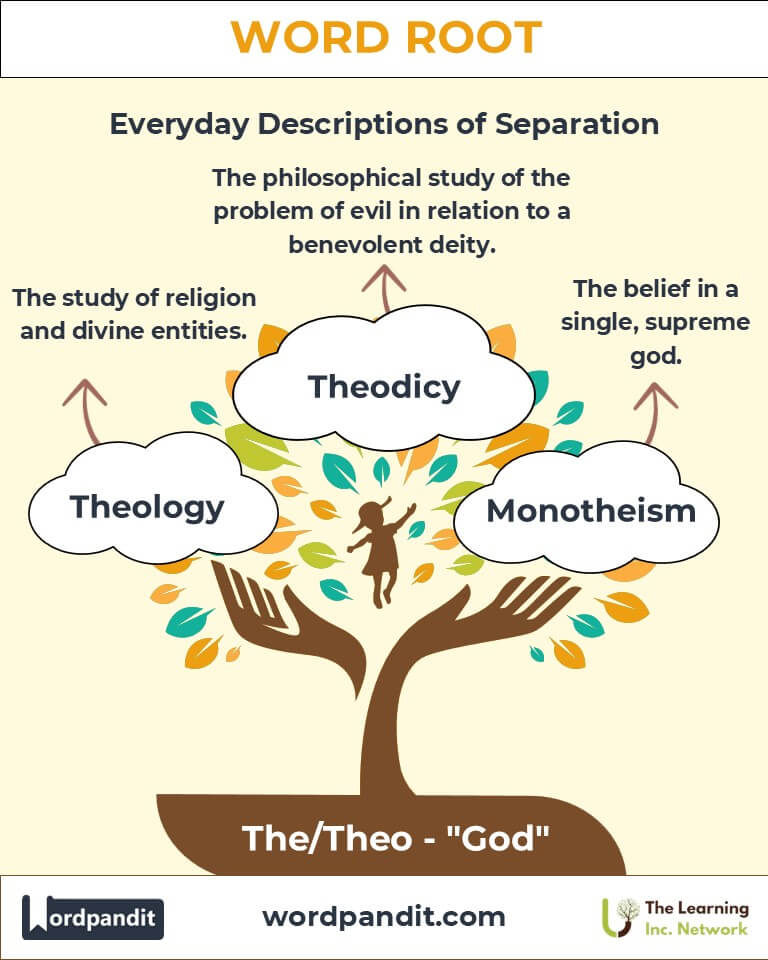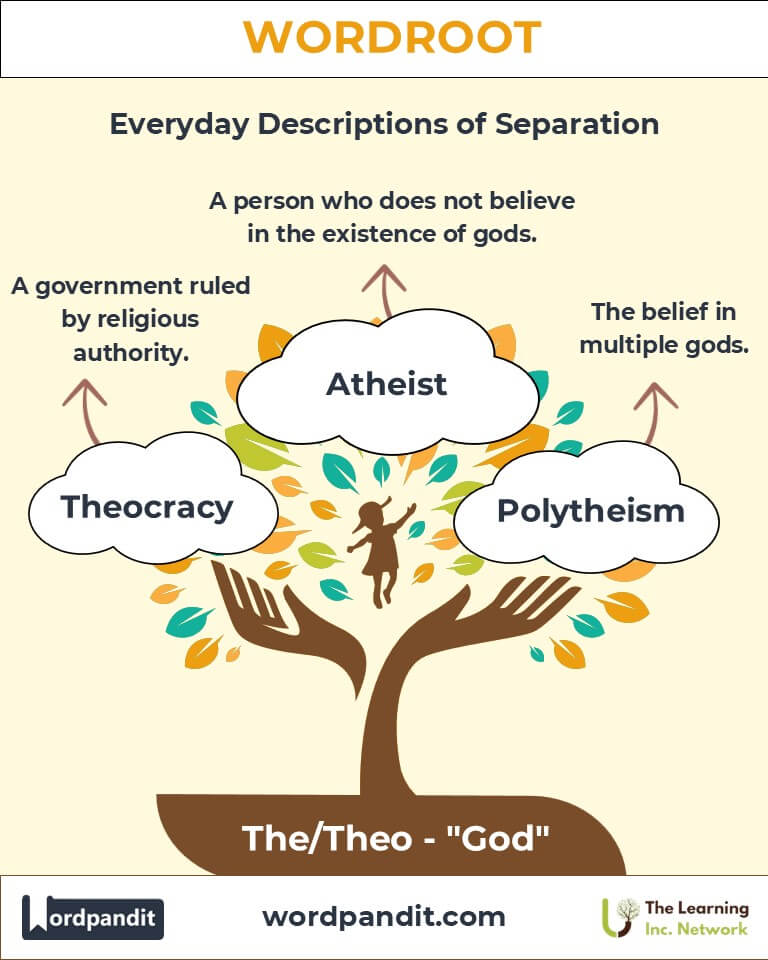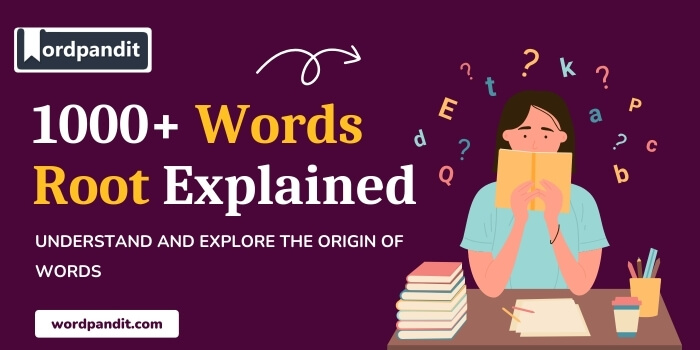The: The Divine Connection in Language and Thought
Byline: Discover the profound roots and impact of "The" and "Theo," derived from the Greek word meaning "god." From theology to atheism, these roots have shaped our understanding of the divine, spirituality, and their absence in philosophical and everyday discourse.

Table of Contents
- Introduction: The Essence of The/Theo
- Etymology and Historical Journey
- Mnemonic: Unlocking the Power of The/Theo
- Common The/Theo-Related Terms
- The/Theo Through Time
- The/Theo in Specialized Fields
- Illustrative Story: The/Theo in Action
- Cultural Significance of The/Theo
- The The/Theo Family Tree
- FAQs About the The/Theo Word Root
- Test Your Knowledge: The/Theo Word Root Quiz
- Conclusion: The Eternal Influence of The/Theo
1. Introduction: The Essence of The/Theo
The roots "The" and "Theo" (pronounced thee-oh) convey concepts of divinity, godhood, and spirituality. Derived from the Greek word theos (god), these roots have influenced terms ranging from theology (the study of divinity) to atheist (one who denies the existence of god). Their widespread use reflects humanity’s enduring quest to understand the divine, whether through affirmation or denial.

2. Etymology and Historical Journey
The roots "The" and "Theo" originate from the ancient Greek theos, meaning "god." In early Greek civilization, theos was central to religious, philosophical, and political contexts. During the spread of Christianity, Latin translations carried the root into words like theologia, which later became theology in English. Similarly, the Enlightenment's focus on reason and science popularized terms like atheist, emphasizing disbelief in deities.
3. Mnemonic: Unlocking the Power of The/Theo
To remember "The/Theo," picture a temple with the word "Theo" inscribed above its grand doors. Inside, debates unfold about divinity, belief, and philosophy.
Mnemonic Device: "Theo stands for temple, theology, and thought about gods."
4. Common The/Theo-Related Terms
- Theology (thee-ol-uh-jee):
- Definition: The study of religion and divine entities.
- Example: "Theology explores questions about God and human existence."
- Atheist (ay-thee-ist):
- Definition: A person who does not believe in the existence of gods.
- Example: "As an atheist, he focuses on science to explain the universe."
- Theocracy (thee-ock-ruh-see):
- Definition: A government ruled by religious authority.
- Example: "In a theocracy, religious leaders guide political decisions."
- Polytheism (pol-ee-thee-iz-uhm):
- Definition: The belief in multiple gods.
- Example: "Ancient Greek polytheism included deities like Zeus and Athena."
- Monotheism (mon-oh-thee-iz-uhm):
- Definition: The belief in one god.
- Example: "Judaism, Christianity, and Islam share monotheism as a foundation."
5. The/Theo Through Time
- Theology: Once synonymous with Christian studies, theology now encompasses diverse religious traditions and even comparative spiritualities.
- Atheism: Initially a controversial stance, atheism gained philosophical legitimacy during the Enlightenment, often linked to the rise of scientific inquiry.
6. The/Theo in Specialized Fields
- Philosophy:
- Theodicy: Explores the coexistence of evil and an all-powerful deity.
Example: "Theodicy addresses the question of why a benevolent god permits suffering."
- Theodicy: Explores the coexistence of evil and an all-powerful deity.
- Politics:
- Theocracy: Examines governance structures influenced by divine law.
Example: "Theocracy shaped many medieval political systems."
- Theocracy: Examines governance structures influenced by divine law.
- Anthropology:
- Polytheism and Monotheism: Root concepts in studying human belief systems.
Example: "Anthropologists compare the societal impacts of polytheistic and monotheistic traditions."
- Polytheism and Monotheism: Root concepts in studying human belief systems.
7. Illustrative Story: The/Theo in Action
Sofia, a student of comparative religion, found herself fascinated by theology's depth and atheism's arguments. During a class debate, she eloquently defended polytheism's cultural significance while questioning the concept of monotheism. Her nuanced understanding of Theo-rooted ideas bridged divides among her classmates, illustrating the root’s power to inspire intellectual exploration.
8. Cultural Significance of The/Theo
The "Theo" root underscores humanity’s timeless engagement with the divine. From ancient rituals invoking multiple gods to modern discussions on atheism and secularism, "Theo" reflects evolving perspectives on belief, morality, and purpose.

9. The The/Theo Family Tree
- Deus (Latin: god):
- Deity: A divine being.
Example: "In Greek mythology, each deity controlled specific aspects of life." - Deify: To treat as a god.
Example: "Ancient rulers were often deified by their subjects."
- Deity: A divine being.
- Div (Latin: divine):
- Divine: Of god-like quality.
Example: "The sunset's beauty was almost divine." - Divinity: The quality of being divine.
Example: "Scholars debated the divinity of certain historical figures."
- Divine: Of god-like quality.
- Mono (Greek: one):
- Monotheism: Belief in one god.
Example: "Monotheism characterizes major world religions like Islam and Christianity."
- Monotheism: Belief in one god.

10. FAQs About the The/Theo Word Root
Q: What does the root "Theo" mean?
A: "Theo" means "god" or "divine" and is derived from the Greek word theos. This root serves as the foundation for many terms that discuss or relate to divinity, belief systems, and spirituality.
Q: Is theology specific to Christianity?
A: No, theology is not limited to Christianity. While it is commonly associated with the study of Christian beliefs, theology encompasses the study of all religions, philosophies about divinity, and various interpretations of spirituality across cultures.
Q: What is the difference between polytheism and monotheism?
A: Polytheism is the belief in multiple gods, each often with specific roles or attributes, as seen in Greek, Roman, or Hindu traditions. Monotheism, in contrast, is the belief in a single, all-powerful deity, as found in religions like Judaism, Christianity, and Islam.
Q: What does "atheist" mean?
A: An atheist is someone who does not believe in the existence of any gods or divine beings. The term combines the prefix "a-" (meaning "not" or "without") with the root "theo" (meaning "god"), literally translating to "without god."
Q: What is a theocracy?
A: A theocracy is a form of government where religious authorities or institutions govern, claiming divine guidance. Examples include historical papal states and some contemporary religious states.
Q: What does theodicy mean?
A: Theodicy is the philosophical study that seeks to reconcile the existence of evil with the concept of a benevolent and omnipotent god. It addresses one of the most profound challenges in religious thought.
Q: What is theology’s relevance today?
A: Theology remains significant in understanding cultural, historical, and moral systems. It also plays a role in interfaith dialogue, ethical debates, and exploring humanity’s ultimate questions about existence and purpose.
Q: Can atheism be considered a belief system?
A: Yes, atheism can be considered a belief system in the sense that it represents a position or philosophy regarding the existence of gods. However, it differs from religions by not adhering to sacred texts, rituals, or deities.
Q: Are there modern examples of polytheism?
A: Yes, modern examples include Hinduism, Shintoism, and certain Indigenous religions. These belief systems often honor multiple deities, each representing aspects of life, nature, or spirituality.
Q: What is the difference between theology and philosophy?
A: Theology specifically focuses on questions related to god(s), religion, and spirituality, often drawing on sacred texts and traditions. Philosophy, on the other hand, is broader, exploring fundamental questions about existence, knowledge, and ethics, often without relying on religious frameworks.
11. Test Your Knowledge: The/Theo Mastery Quiz
1. What does the root "Theo" mean?
2. Which term describes a government ruled by religion?
3. What is atheism?
4. Which term refers to belief in one god?
5. What does theology study?
12. Conclusion: The Eternal Influence of The/Theo
The roots "The" and "Theo" anchor words and ideas that have shaped human civilization's spiritual and philosophical landscapes. From theology to atheism, their enduring relevance invites exploration of belief, doubt, and everything in between. As we continue to grapple with the divine in modern contexts, "Theo" reminds us of humanity’s endless pursuit of understanding.












